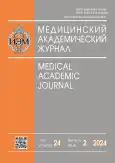Directed modification of characteristics of syntetyc analogue of proline-rich peptide ChBac3.4 through dendrimerisation
- Authors: Galianova M.V.1
-
Affiliations:
- Institute of Experimental Medicine
- Issue: Vol 24, No 2 (2024)
- Pages: 57-60
- Section: Original study articles
- URL: https://journals.rcsi.science/MAJ/article/view/271130
- DOI: https://doi.org/10.17816/MAJ630266
- ID: 271130
Cite item
Abstract
BACKGROUND: According to the World Health Organization, microbial resistance to antibiotics is one of the most serious threats to human health, food safety and economic development. Antimicrobial peptides of animal origin, to which resistance is difficult to develop, appear to be a promising option to overcome this problem. To solve one of the problems in the practical use of peptides — their rapid degradation in blood plasma — dendrimerization of linear analogues of already existing antimicrobial peptides can be used. This work shows that dendrimers of shortened analogue of the natural proline-rich peptide ChBac3.4 are superior in antimicrobial activity to the original peptide and are much more stable in blood serum. At the same time, as the original peptide, branched analogues do not have hemolytic activity.
AIM: The aim of this study is to develop new structural analogues of a peptide that have improved stability in blood serum while maintaining high antimicrobial activity. To achieve this, we intend to create dendrimeric (branched) molecules by synthesizing peptides using solid-phase methods.
MATERIALS AND METHODS: We will investigate the antimicrobial properties of the peptides using the method of serial dilutions in a liquid nutrient medium against both Gram-positive and Gram-negative bacteria. We will also assess the stability of the peptides by culturing them in the presence of human blood serum.
RESULTS: After making modifications to the original peptide, we expect to see a significant increase in its antimicrobial activity against all strains tested. Additionally, we anticipate that the resistance of these peptides will increase many times over.
CONCLUSIONS: Overall, our findings suggest that dendrimerization can effectively improve the properties of proline-rich peptides, making them more suitable for use in medical applications.
Full Text
##article.viewOnOriginalSite##About the authors
Maya V. Galianova
Institute of Experimental Medicine
Author for correspondence.
Email: mayagalianova@gmail.com
ORCID iD: 0009-0008-1821-0723
Laboratory Assistant at the Department of General Pathology and Pathophysiology
Russian Federation, Saint PetersburgReferences
- Zhang QY, Yan ZB, Meng YM, et al. Antimicrobial peptides: mechanism of action, activity and clinical potential. Mil Med Res. 2021;8(1):48. doi: 10.1186/s40779-021-00343-2
- Kopeikin PM, Zharkova MS, Kolobov AA, et al. Caprine bactenecins as promising tools for developing new antimicrobial and antitumor drugs. Front Cell Infect Microbiol. 2020;10:552905. doi: 10.3389/fcimb.2020.552905
- Bracci L, Falciani C, Lelli B, et al. Synthetic peptides in the form of dendrimers become resistant to protease activity. J Biol Chem. 2003;278(47):46590–46595. doi: 10.1074/jbc.M308615200
Supplementary files






